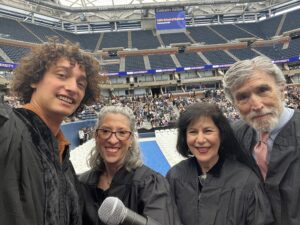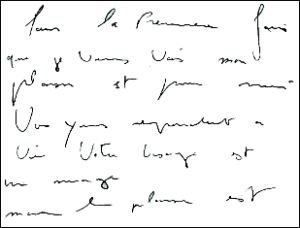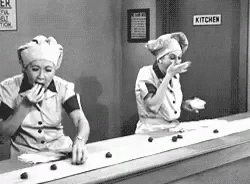May 15, 2023. Undergraduate, graduate, and Ph.D. students at Pace University in NYC were ready for their big day. Two thousand of them. Their hard work was done. Mine was just beginning.
Fact: voice-over actors are usually heard and not seen. We’re the disembodied voices of GPS systems, public transportation announcements, animated characters in cartoons, documentary narrators, authoritative teachers in medical education, corporate eLearning, and so much more. We’re the ones who have “faces for radio.” Sometimes, we’re even the “Voice of God.”
Voice of God
The term “Voice of God” (VOG) refers to any anonymous voice used to deliver general messages to an audience– usually in a live situation: the theatre or an awards ceremony. It’s an authoritative, omniscient voice that seemingly comes from another time or space, gets people’s attention, and shares timely information.
* Speaker introductions: “Please welcome tonight’s host, Jane Lynch!”
* Audience directions: “Ladies and gentlemen, please take your seats, the show is about to begin.”
* Performer substitutions: “At today’s performance of Hamilton, all the understudies are performing!”
The best VOG voice talent sounds like an expert. She knows her stuff and strikes the right tone between authority and warmth.
We also call this “live-announcing, ” which I’ve done before (and sometimes is prerecorded), in NYC at Lincoln Center’s Alice Tully Hall and Cipriani’s elegant Midtown and Downtown venues, where I was backstage, up in the lighting booth, or nestled in a corner with a script, a light, and a mic. Not this time. This time I was to be seen and heard.
The Setting.
There I was at the site of the 1939 World’s Fair, the 1964 New York World’s Fair, and now the Arthur Ashe Stadium. The largest tennis arena in the world. The US Open tennis tournament’s main stadium has a capacity of 23,771. I was dressed for the occasion: a black graduation gown, no cap. But it wasn’t my day to graduate. It was my day to facilitate other people earning their academic degrees.
My job? Stand behind a podium on stage left, and announce each graduate as they prepare to walk across the stage to shake hands with the Dean of their school.

Sounds simple, right?
Luckily three voice-over talents were working this job with me; one other woman and two men. We buddied-up to make co-ed pairs. Then we briefly met with the stage manager to discuss the game plan.
First, there was the choreography. Then, there was the timing.
Last, and most importantly, there were the name cards.
Choreography
How did the students get to the stage? Once they were on the stage, at what point were we supposed to say their names? As they started walking across? When the person on stage handed them a scroll (aka a prop diploma)? Or when they made contact with the President or Dean of their school who was shaking their hand in congratulations?
Timing
If you’ve ever attended a large graduation ceremony, you know it can take forever to sit through hundreds or thousands of names waiting for your son/daughter/sister/brother/cousin/nephew/niece/friend/loved one to have their
moment in the sun. So it was on us, the announcers, to keep the pace moving. But we couldn’t just rattle off names Willy-Nilly. We needed to coordinate the right name for each student, so it was clear who was who. It got confusing when three students were on stage simultaneously. Is the name that was just called the person who is starting to walk, already walking, or the one in the midst of shaking hands?!
The Name Cards
Names matter. Your name is your identity. When you hear it spoken at home, or out in public, your ears perk up. Who’s calling me? I’ve always gone out of my way to pronounce people’s names correctly. When a name is unfamiliar, and I don’t immediately “get it,” I ask the person to spell it and say it again so that I can understand it and say it– as they do. In voiceover, the accurate pronunciation of all words is critical, and as an expert medical narrator, I work hard to easily speak the most complicated words.

Let’s get back to those 2,000 students. Their heritage is global. Some are first-generation or second-generation Americans. Most do not have American-sounding names. Many have beautiful names that mean beautiful things in their native languages.
They are proud of their names. And they wrote them on a 4 x 6 card in their unique handwriting. When was the last time you looked at someone’s handwriting? Most of what we read is printed– in an email, on the web, in a magazine. Most of us can read our own handwriting but often struggle to decipher words written by someone else.
So, there’s that.
They were encouraged to offer a phonetic spelling of their name to help us, the readers, speak their name correctly. Let me tell you, most people do not know how to indicate the phonetic spelling of a word accurately. They think they’re doing it (it makes sense to them), but they’ve neglected to break the word into syllables, indicate which syllable is accented, explain when an X sounds like a C or a J sounds like a Y, or offer a ‘rhymes with’ comparison. That’s why when I have a question about a word in a script, I don’t just ask my client how it’s pronounced, (for fear their explanation won’t be clear to me), but I offer options so they can easily select the correct one.

Let’s get back to the ceremonies. We had an assembly line of workers facilitating the smooth and rapid movement of the students. As they approached the bottom of the stairs to the stage they handed their name card to someone on their right, who handed the card to someone on their right at the top of the stairs, who passed it to their right for me to decipher in two seconds, and read with confidence, accuracy and a congratulatory tone.
Then the card got handed to my partner, who was on my right, who then handed it to someone on his right, who was collecting all the cards. When it was my partner’s turn to read (we alternated with each name), I handed it straight to him after receiving it, for him to read with even less time, before handing it to the card collector.
Do you remember the I Love Lucy Chocolate Factory episode? Yup, those cards were coming fast and furious, they were nearly impossible to read and say accurately, and there was the next one in hand or being handed over.
A Mix of Thrills and Challenges
Ok, you get the picture. It was hard, AND, it was an incredibly wonderful experience to be with these people at the climax of their academic careers, to feel their excitement, their pride, their moment to shine in front of friends, family, fellow students, their professors, deans and the President of Pace University.
I felt happy for each of them. I smiled at their effusiveness when one did a spin or a bow. There was electricity in the air and it was contagious. I spoke those names with the pride of a Mama Bear, even if I didn’t pronounce all of them perfectly.
Next year I’ll do better.
Here are a few names that gave me pause.
(Remember you have two seconds to see it and say it!)
Oluwadamilola – T’khi Q. – Palanilkunnathil – Phanpapohn – Xiaohui Anwalimhobor- Palaszczuk -AshokkummarBarmecha – Gurubachansingh –
Boursiquot – Voytelmgum – Brzozowski – Gjonaj – Tyukhtina
P.S. After writing this article, I decided to look up the names of the producers and hosts of NPR’s “Throughline,” who I listen to whenever I’m in the car, and I can never quite catch their names. They are Ramtin Arablouei and Rund Abdelfatah. Next time, I’ll understand them better and practice saying their names with them.